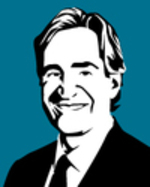The fact that data has the power to change our business and personal lives has put data science and analytics at the center of how marketing is done. Every digital click, swipe, "like", buy, comment and search produces a unique virtual identity - something that Malcom Frank, EVP of strategy and marketing for Cognizant, calls a Code Halo™, a.k.a. digital exhaust. But in order to use data to drive meaningful results companies need to know what they're looking for and how to make correlations. Businesses such as Apple, Google, Facebook and Amazon have had an unprecedented growth in value based on their ability to perform mass customization - creating new expectations in consumers and causing businesses in every industry to change the way they work. I recently wrote about the 5 trends shaping the future of work - all lines-of-business can be disrupted given the rapidly evolving landscape, including information technology (IT).
As a global leader in business and technology services, Cognizant's 185,000 employees are helping their Fortune 500 clients bring the future of work to life using the SMAC Stack (social, mobile, analytics and cloud). In addition to his role of chief strategy officer and CMO, Malcom also heads a digital consulting group where he helps clients navigate the transition to the digital economy. Malcom offers his insights into how companies can get into the future of work - which is now.
5 Must-Have IT Skills for the Future of Work
1. Understand and champion SMAC technologies - Cognizant's Center for the Future of Work has brought together world class analysts and a number of academic institutions to look at how industry and company structures, and very nature of work itself, needs to transform to meet consumer expectations. Driven by the consumer market, together social, mobile, analytics and cloud technologies have clearly transformed our personal life and they add a new dimension to company business models. Cognizant's formula for the Future of Work is called SMAC - social, mobile, analytics and cloud on one integrated stack, where each function enables another to maximize their effect. The SAMC Stack is the new enterprise IT model delivering an organization that is more connective, collaborative, real-time and productive
2. Build Code Halos around consumers - All of us now live virtual as well as physical lives. Every online action leaves a digital exhaust, which some companies have become very good at seeing, leading to their domination of their markets. In his new book, Code Halos: How the Digital Lives of People, Things and Organizations are Changing the Rules of Business, Malcom talks about how Code Halos are becoming increasingly vital to the success of every business. "By starting to build a code halo around customers the effect of what they do will form the basis for what you provide as a company so you are there and the right place, the right time and with the right product," says Malcom, who also advises companies who sell products to instrument the machines and put code halos around their actual products as well.
3. Consumer oriented software design drives user adoption - Most internal IT groups are not known for building beautiful systems, but according to Malcom, design matters and from an IT perspective one of the new skill sets required today is the ability to build beautiful and engaging systems for consumers. He notes that design is more than just a pretty interface, it's how someone interacts with your product. Companies like Infor have taken the link between design and enterprise software to this next level. Consumer oriented design has to become a core competency of the technology team and they need to not only design the experience but also the business model to deliver them. "The business and technology need to become one in the same and companies need to get these two together as quickly as possible," says Malcom, who adds that in some companies the role of CDO can fill this void.
4. Get serious about data science - Relying on the data to lead companies to the right answer verses talking the HPPO (highest paid person's opinion) is a shift in the culture of many organizations. SAP's CMO, Jonathan Becher, employs "data scientists" to enable the marketing organization and the rest of the company to make decisions on their own based on a variety of data points. Technology driven marketing gives companies the ability to build 1-to-1 relationships, create individualized experiences and leverage technology in new ways. Malcom says it's important to find people who understand systems and data infrastructure and who also have a great interest in the business. Using data to refine the experiences you offer down to that segment of one opens up new opportunities for mass customization and influencing the product development life cycle. With this level of data on what customers are actual buying, companies are able to get insight into what consumers will want in their product, allowing them to build the products that consumers actually want to buy.
5. Be aware of privacy versus customization challenges - Creepiness and security are the roadblocks to 1-to-1 massive customization Malcom warns. For an app like Pandora, the give is not that big. You give your music tastes and you get hours of listening pleasure, however as the 'give' gets bigger, such as with financial information or information about family members, the 'get' needs to be considered. Companies will need to determine where people will be comfortable or not. As we put more online, the security risks of bad online activity will only increase and people will need to determine what risks they are we willing to incur for the upside of convenience.
You can watch the full interview with Malcom Frank here. Please join me and Michael Krigsman every Friday at 3PM EST as we host CXOTalk - connecting with thought leaders and innovative executives who are pushing the boundaries within their companies and their fields.

